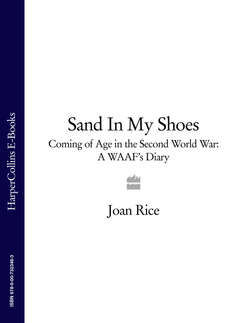Читать книгу Sand In My Shoes: Coming of Age in the Second World War: A WAAF’s Diary - Joan Rice - Страница 7
INTRODUCTION
ОглавлениеIn 1939 I was nineteen years old, living with my parents in the small Surrey village of Claygate. We had a detached house, a largish garden, a car in the garage. Our comparative prosperity was a recent event; my parents, whose financial highs and lows had punctuated my childhood, had found themselves three years earlier on a high. I was now a typical middle-class unmarried daughter. I had left school at just seventeen with matriculation. No thoughts of higher education were considered. Universities were not an option for girls except for the brilliant few or those with wealthy parents who did not consider a university education a waste of time for their daughters.
Like many of my contemporaries I went to a secretarial college and from there to a job as a shorthand typist. I was considered to be one of the lucky ones. I was taken on by the Asiatic Petroleum Company (Shell) which – according to the principal of my college – chose only the cream of the cream. As the cream we were paid top salaries, £2 10s (old money) a week as opposed to the £2 paid by the next most desirable firm – ICI.1 My fellow typists in Bitumen, the department to which I was assigned, were a pleasant lot; the work, if boring as far as I was concerned, was far from arduous and the attitude of Shell towards its female staff was positively paternal. We might have to wear a uniform provided free by the firm – navy-blue serge in winter, beige shantung in summer – until we reached the rank of senior secretary, but unlike the men and almost everyone else in those days, we did not have to work on Saturday mornings.
There was a staff canteen where we were provided free with morning coffee and afternoon tea, and an excellent lunch at bargain prices. On Fridays, just before pay day, a satisfying dish of chips and peas and lashings of gravy could be bought for five (old) pence. Our leisure hours were equally well catered for. On the river at Teddington near where I lived was Lensbury, the firm's palatial sports club where just about every sport was provided for and where there were weekly dances. In Claygate itself there was a tennis club and an amateur dramatic society. Nearby Richmond had an ice-skating rink. The cinema was a walk across the common to Esher. I had a bicycle; I was learning to drive. It was the sort of life most girls of my class were contented with until they were married.
I wanted to get married, of course, since the alternative was to end up a despised spinster like the head of our typing pool, an old woman of forty, pitied and mocked by us younger girls. In my depressed moments I saw that as being my fate. I was not a success with my male contemporaries. However hard I tried to conform to the then social climate where men called all the shots, they seemed to sense that I was different in an undesirable way. My ambitions were not the ambitions of my contemporaries. I wanted to write; I wanted to travel; I wanted to be famous. But all I got were rejection slips from editors, and how could I save up for a world trip on £2 10s a week?
Then, in September 1939, war was declared. This was my opportunity, I seized it immediately. I joined the Women's Auxiliary Air Force (WAAF).
This diary covers the years from September 1939 to December 1942, by which time I was engaged. Thereafter until the end of the war if I wanted to write up any goings on, I did so in letters to my fiancé, later my husband.
For the first eighteen months of the war I was posted to the RAF Station, Hendon as a secretary, progressing from ACW22 to corporal, and where the so-called ‘phoney war’ eventually gave way to the Battle of Britain and the bombing of London. RAF Station Hendon also had its share of air raids during this period.
In May 1941 I was commissioned and posted to RAF Medmenham as a photographic interpreter.3 This, for me, was the least enjoyable period of my WAAF career, but it led in January 1942 to an overseas posting to Egypt. There I remained for two years, except for an interlude when the WAAF members of our unit were evacuated to what was then Palestine. (We owed this abrupt departure to General Rommel and his army who had come dangerously near to occupying Cairo.) In this, final section I have included excerpts from my husband's own diary.
In January 1944 I was given a compassionate posting back to England. My husband, after service with the Eighth Army through the desert, Sicily and Italy, had also returned home to join the preparations for the Second Front. As a result I became pregnant and left the WAAF in the summer of 1944. In November that year the first of our three sons4 was born.
Joan Rice
1 Imperial Chemical Industries plc.
2 Aircraft Woman 2nd Class.
3 Photographs of enemy territory were taken, brought back and examined for any relevant information.
4
1944 Tim. Lyricist, author and broadcaster
1947 Jonathan. Author, broadcaster and lecturer
1950 Andrew. Advertising guru (South Africa) and broadcaster
